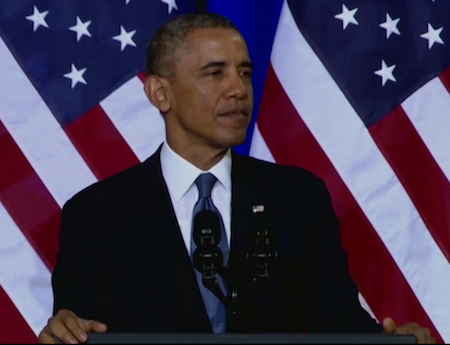President Launches Review of Big Data and Privacy

The smarter way to stay on top of broadcasting and cable industry. Sign up below
You are now subscribed
Your newsletter sign-up was successful
President Barack Obama said Friday that he is charging adviser John Podesta with leading a "comprehensive review of big data and privacy," which will enlist Eric Schmidt, executive chairman of Google, and the other members of the President's Council of Advisors on Science and Technology.
The President said that group would "reach out to privacy experts, technologists and business leaders, and look at how the challenges inherent in big data are being confronted by both the public and private sectors; whether we can forge international norms on how to manage this data; and how we can continue to promote the free flow of information in ways that are consistent with both privacy and security."
That came in a speech at the Justice Department on a number of changes to government data information collection that he said would end the bulk data collection program as it is currently formulated, but not end it. Those changes include more congressional oversight, collecting less information—two degrees rather than three removed from a terrorist, for example; and adding an independent advocate on the FISA (Foreign Intelligence Surveillance Act) court, which reviews government requests to collect data.
The President acknowledged that the speed of technological change raises issues about conflating the ability to do something with its advisability, a question increasingly raised by the speed and power of the Internet.
"The power of new technologies means that there are fewer and fewer technical constraints on what we can do. That places a special obligation on us to ask tough questions about what we should do," he said. "[T]he combination of increased digital information and powerful supercomputers offers intelligence agencies the possibility of sifting through massive amounts of bulk data to identify patterns or pursue leads that may thwart impending threats. But the government collection and storage of such bulk data also creates a potential for abuse."
The President said bulk data collection would continue, but that the government would not be the one holding that data. It was unclear just who would be doing that. The President said that there were problems with putting the onus on telecom companies or a third party exclusively to be the repository, so the details had yet to be worked out.
The President's comparison of marketing data collection with government surveillance did not sit well with the Digital Marketing Association (DMA), which indicated it was not pleased that the President in the speech had "conflated" marketing data with government surveillance.
The smarter way to stay on top of broadcasting and cable industry. Sign up below
"DMA was disappointed to see the responsible use of consumer data for marketing purposes conflated with 'government surveillance,' DMA said in a statement following the speech. "As revelations regarding NSA practices have come to light in recent months, DMA has been working hard to make it clear to policymakers and the media that issues around government surveillance are not related to data-driven marketing.
"For more than four decades, DMA has ensured that data is used responsibly across the data-driven marketing industry, creating and enforcing Guidelines for Ethical Business Practice to ensure that consumers have robust transparency and meaningful choices about how data is used for marketing purposes."
The group was responding to the following:
"[C]hallenges to our privacy do not come from government alone," the President said. "Corporations of all shapes and sizes track what you buy, store and analyze our data, and use it for commercial purposes; that’s how those targeted ads pop up on your computer or smartphone. But all of us understand that the standards for government surveillance must be higher. Given the unique power of the state, it is not enough for leaders to say: trust us, we won’t abuse the data we collect."
The President also stood up for for the intelligence community, calling them patriots, and beginning his speech by pointing out that "At the dawn of our Republic, a small, secret surveillance committee borne out of the “The Sons of Liberty” was established in Boston. The group’s members included Paul Revere, and at night they would patrol the streets, reporting back any signs that the British were preparing raids against America’s early Patriots."
The President said that nothing he has learned from a review of NSA practices "indicated that our intelligence community has sought to violate the law or is cavalier about the civil liberties of their fellow citizens."
Sen. Rand Paul, a big critic of the program who is suing the administration over the NSA data collection, was not assuaged.
"Paul Revere wasn't warning us that the Americans are coming," he said on CNN. "We don't need all this extra collection of information."
"Overall, the strategy seems to be to leave current intelligence processes largely intact and improve oversight to a degree," said Mozilla in a blog posting after the speech. "We’d hoped for, and the Internet deserves, more. Without a meaningful change of course, the Internet will continue on its path toward a world of balkanization and distrust, a grave departure from its origins of openness and opportunity."
WikiLeaks founder Julian Assange, interviewed on CNN, said the President had not provided any meaningful protection for U.S. businesses who are being compelled to become an arm of U.S. surveillance. Assange published data from NSA leaker Edward Snowden, whose revelations arguably forced the President's hand on the changes announced Friday.
Contributing editor John Eggerton has been an editor and/or writer on media regulation, legislation and policy for over four decades, including covering the FCC, FTC, Congress, the major media trade associations, and the federal courts. In addition to Multichannel News and Broadcasting + Cable, his work has appeared in Radio World, TV Technology, TV Fax, This Week in Consumer Electronics, Variety and the Encyclopedia Britannica.

